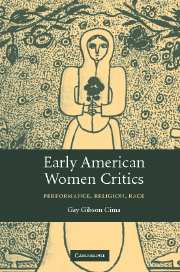Book contents
- Frontmatter
- Contents
- Acknowledgments
- Introduction
- 1 Colonial Women Critics: Performing Religion, Race, Possession, and Pornography
- 2 Revolutionary Women Critics: Performing Rational Christianity, Patriotism, and Race
- 3 Republican Women Critics: Performing Christian Activism, American Culture, and Race
- Index
- References
2 - Revolutionary Women Critics: Performing Rational Christianity, Patriotism, and Race
Published online by Cambridge University Press: 22 September 2009
- Frontmatter
- Contents
- Acknowledgments
- Introduction
- 1 Colonial Women Critics: Performing Religion, Race, Possession, and Pornography
- 2 Revolutionary Women Critics: Performing Rational Christianity, Patriotism, and Race
- 3 Republican Women Critics: Performing Christian Activism, American Culture, and Race
- Index
- References
Summary
Let sin, that baneful evil to the soul, / By you be shunn'd … An Ethiop tells you 'tis your greatest foe.
Phillis Wheatley, “To the University of cambridge, in new-england”And may each clime with equal gladness see / A monarch's smile can set his subjects free!
Phillis Wheatley, “To the king's Most Excellent Majesty”By Liberty, by Bondage. I conjure you …. e'er we'll be slaves, we'll pour our choicest blood.
Mercy Otis Warren, The Adulateur, 29, my italicsDuring the pre-Revolutionary War period, the furor of the Great Awakening subsided as Americans battled King George III's invasive new regulations, from the Stamp Act of 1765 to the customs and taxes precipitating the American Declaration of Independence in 1776. Pennsylvania and Massachusetts, centers of colonial opposition to British oppression, proved particularly congenial training grounds for women critics. Often justifying their behavior through the new theory of natural rights, Northern women sought expanded access to public debates from the 1730s to the 1780s. Like female exhorters, they hoped to unlink visibility and identity. They adopted host bodies to protect themselves as they helped shape and critique the tangle of politics, religion, and race. Many adopted “patriot” host bodies to lambaste British imperialism. Others created a composed, “rational Christian” host body, building upon Enlightenment notions of the rational citizen. There were many ways to inhabit this rational Christian body, and some involved an attempt to validate a local culture.
- Type
- Chapter
- Information
- Early American Women CriticsPerformance, Religion, Race, pp. 70 - 148Publisher: Cambridge University PressPrint publication year: 2006



